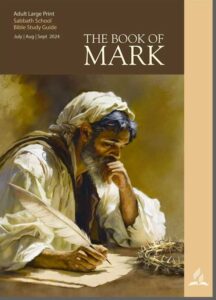The Gospel of Mark
From the beginning of Mark, the reader knows who Jesus is–the Messiah, the Son of God (Mark 1:1). However, people in the story struggle with understanding just who He is and what He is all about–except for those with demons. They know exactly who He is! The demons recognize Him and wither before His mighty words.
But Jesus rather consistently commands that they keep this information quiet. Why this command for secrecy? Bible students for centuries have mulled over this question. It even has a name in scholarship—the Messianic Secret. Why would a gospel want us to keep quiet about who Jesus is?
What will become clear in this journey through the Gospel of Mark is that not only is there secrecy in this book–there is also amazing revelation. It can rightly be called the Revelation/Secrecy Motif, and it runs through the Gospel of Mark, though at the end all the secrecy is surprisingly ended, replaced with a powerful revelation of Jesus.
Mark can be divided into two distinct sections–halves, actually. Chapter one through near the end of chapter eight deals with the crucial question, Who is Jesus? The answer is displayed in His teachings and His miracles. Over and over He defeats evil, brings hope to the oppressed, and teaches compelling truths that cut to the heart of human existence. All this shouts to the reader that He is the Messiah, the Christ, whom the Hebrew people have long been awaiting.
However, it is not until the middle of the book that someone not demon-possessed rightly declares who He is, thereby answering the question of the first half of the book about Christ’s identity. And that person is Peter, who declares, “ ‘You are the Christ’ ” (Mark 8:29, ESV).
The second half of Mark, from Mark 8:31 to the end of the book, answers the other question, Where is Jesus going? The answer is shocking. He is going to the cross, the most ignominious and shameful manner of death in the Roman world. And it is such an unexpected destination for the Messiah, who His followers think will defeat Rome and establish Israel as a powerful nation.
Jesus’ bumbling disciples cannot fathom what He is saying. As the book progresses, they ask less and less about this painful topic, until finally they are reduced to silence in the face of the unwelcome truth.
Things look gloomier and gloomier when Jesus confronts the religious leaders who plot His demise. The disciples, hopeful of a glorious kingdom, are shocked by an arrest, trial, and crucifixion that defies their expectations.
But through all this, Jesus keeps a clear and consistent message of where He is going and what it means that He will die and rise again. The bread and cup of the Last Supper will represent His body and blood (Mark 14:22-25), and He will become a ransom for many (Mark 10:45).
This does not mean He went to the cross in stoic calmness. In Gethsemane He struggles with the decision (Mark 14:32-42), and on the cross He cries out in despair, “ ‘My God, My God, why have You forsaken Me?’ ” (Mark 15:34, NKJV). The Gospel of Mark shows us the darkness that Christ experienced, the cost of our salvation. But the cross is not the end of the journey. After His resurrection, He plans a meeting with His disciples in Galilee–and, as we know, the Christian church began.
It is a most remarkable story, told in a terse, fast-moving style with little commentary from the Gospel writer himself. He simply tells the story, and then lets the words, the deeds, the actions speak for themselves regarding the life and death of Jesus of Nazareth.
Thomas R. Shepherd, PhD, DrPH, is senior research professor of New Testament at the Seventh-day Adventist Theological Seminary, Andrews University. He and his wife Sherry have two grown children and six grandchildren.


When we have a short book like the Gospel of Mark, I think it is always a good idea to read it right through as a story before we go back and dissect it. Carmel and I read or listened to all four gospels recently throughout a couple of weeks and were surprised at some of the big-picture ideas we discovered. I extend the invitation to our readers to read Mark in the first week of this new quarter.
I agree with you Maurice that’s why I started reading Marks gospel today!
Thank you, Brother Maurice, for your wisdom.
I followed your suggestion, and I listen to the entire book of Mark today. It is such an exciting and rewarding book, to read and remember what Mark wrote about Jesus’ earthly ministry. Now I feel that I’m ready to teach the Book of Mark in Sabbath School. I plan to read it through again while we study this quarterly. Thanks again and be blessed.
God’s blessing to you All!
Thank you for the insight will read it too